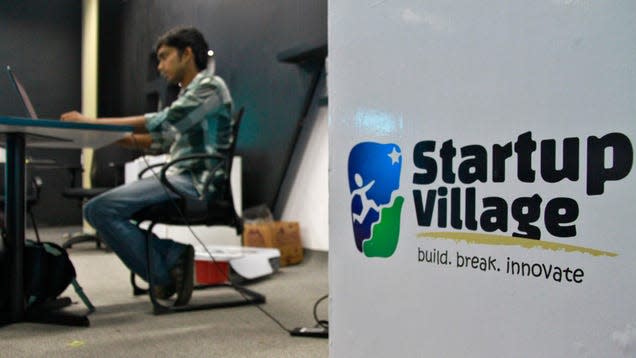For Indian startups, the coming summer promises a funding winter

Indian startups are grappling with a funding squeeze, triggered by a slew of factors: monetary policy tightening worldwide, rising inflation, and a global economic slowdown.
In the first quarter of 2023, startups in India raised about $5.5 billion, down 66% from $16 billion in the same period a year ago, according to data collected by Venture Intelligence, a research firm in Chennai. Of the 184 investment deals struck in this period, the largest ($700 million) was between the Hyderabad-based renewable energy major Greenko Group and Singapore’s GIC, the Abu Dhabi Investment Authority, and others.
Read more
The worst-hit firms in this funding crunch were IT and banking-related startups.
Venture capital funding is slowing down in India
In 2022, venture capital firms invested $46 billion in India, down 29% from the record high of 2021. As the global economy sank into turmoil, foreign funding became particulary hard to secure. This was primarily due to stretched valuations and high overhead costs, venture capitalists said.
A dearth of funds has compelled startups to wind down their scale of operations and lay off staff. This also delayed their listing plans.
“As public markets are the final judge of valuation, private investors have understood that unless the company has the potential to earn extraordinary margins or maintain extraordinary organic growth, the earlier multiples won’t work,” Mayank Shiromani, director at MUFG Innovation Partners, told Quartz. MUFG Innovation Partners is the corporate venture capital arm of the Mitsubishi UFJ Group.
The US Federal Reserve’s policy tightening has hiked the cost of funds
Investors from the US comprise the largest funders in India’s startup economy. So the US Fed’s monetary regime over the last year or so has indirectly sent tremors into the Indian startup landscape.
The Fed’s interest rates had been hovering near zero until April 2022, and as a result, startups were flush with cheap money. Global investors were looking to park their funds in high-yielding avenues during the pandemic, as rates on government securities and other debt instruments were low.
As rates rose, though, venture capital funding receded, causing lower cash flows and valuations. The priorities of investors tightened. “Given the current risk parameters, investors are focusing on startups that have strong cash flows with profitability in place,” said Rajeev Suri, managing partner of Orios Venture Partners.
High inflation has eaten away at the profitability prospects of Indian startups
Due to supply chain disruptions, accentuated by the Ukraine war, inflation also zoomed upward in most countries in 2022, India among them.
Input costs, driven by rising commodity and energy prices, increase operational costs. As input prices rise, marginal costs increase. This makes it difficult for startups to generate a net positive cash flow. From a venture capital firm’s standpoint, lower profits leave little for investments.
“Business owners have cut back on their financial outlays, shut down losses-making ventures, and started to carefully consider unit economics,” Neha Singh, a co-founder of the startup data platform Tracxn, told The National in March.
India’s startup economy is in a reset mode
Indian startups are revisiting their rich valuations of 2020 and 2021, which were fueled by an expansion of tech-enabled services such as Paytm, Zomato, Nykaa, and Zerodha. Those skyhigh valuations did not yield major profits, however.
The first indications of a souring of the Indian market came when the 2021 listing of Paytm, a fintech company, proved to be a damp squib. Since then, investors have emphasized metrics such as fair valuation, profitability, consumer reach, and the ability to scale sustainably.
“All of the current events necessitate a complete shift in thinking for startups; they will have to expect and prepare for greater and more unpredictable risks and be ready to pivot when required,” said Suri.
While venture capitalists believe Indian startups have immense longterm potential, they also see the need to recalibrate their fundamentals and business metrics.
“The country’s abundant talent pool and its knack for creating cutting-edge solutions that cater not only to the local market but also to a global audience further amplify its appeal as a prime investment destination,” said Abhimanyu Bisht, general partner of CapFort Ventures.
More from Quartz
Sign up for Quartz's Newsletter. For the latest news, Facebook, Twitter and Instagram.

